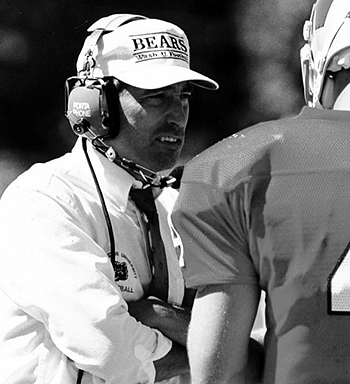Coaches have different methods of motivating their football teams.
Some, like Pittsburgh Steelers coach Bill Cowher, growl, scowl, rant and rave and pace the sidelines. Some, like former Notre Dame coach Lou Holtz, talk up the opposition to national championship levels. And some, like Division III St. John’s University coach John Gagliardi, make sure not to take themselves too seriously.

Then there’s University head football coach Larry Kindbom, who chooses to use stories of past success as a motivator. But it’s not his successes he uses — it’s the successes of well-known people from all walks of life.
For the past eight years, Kindbom has taken it upon himself to write to various business people, entrepreneurs, television personalities and those from the world of sports, among other fields, asking only in return a letter to his team to inspire the student-athletes to be the best contributors they can be.
This year, he’s taken the responses and self-published a book, Playbook of Champions, giving the student-athletes a collection of some 120 letters, including one from each of their high-school coaches. In other years, he would read a letter to the players before practice and then post it on the team bulletin board.
Kindbom has received responses from people such as former U.S. Sen. Bob Dole, Vice President Al Gore, Southwest Airlines executive Herb Kelleher, sportscaster Bob Costas, basketball coaches Mike Krzyzewski and Bobby Knight and a host of other notables.
“I did it the first time back in 1998,” Kindbom said. “I wrote several people around the world who had achieved success in their respective professions. The list was a ‘who’s who’ kind of a list. I acknowledged that I was coaching at Washington University, and we had a stellar group of student-athletes on our football team who would benefit from the wisdom of someone who had already achieved success in their lifetime.”
According to Kindbom, the response was fantastic. Kelleher was the first to respond to the more than 100 letters Kindbom originally sent out, and the coach immediately knew he was onto something good.
“When the CEO of a company that has been in the black for over 20 straight years has time to write a personal letter, the project was already successful, even if another letter was never received,” Kindbom said.
After that, the letters poured in from people like Jack Hanna of the Columbus Zoo and Aquarium, former Nebraska football coach Tom Osborne, ESPN broadcaster Trey Wingo, Chancellor Emeritus William H. Danforth, August A. Busch III, Schutt Sports President Julie Nimmons, and Jim Kavanaugh and David Steward, founders of World Wide Technology Inc. (WWT), ranked as the nation’s top-grossing black-owned industrial/service company with annual sales nearing $2 billion.
Some people go beyond merely writing a letter.
WWT’s Steward sent a copy of his book, Doing Business by the Good Book: 52 Lessons on Success Straight from the Bible, to every player.
Best-selling author and CEO Harvey Mackay, who has a syndicated column on business in more than 50 magazines around the country, also sent the players a copy of one of his books, The Harvey Mackay Rolodex Network Builder.
The words Kindbom has collected could be beneficial to more than his players.
“The goal was to give our players a chance to perhaps learn something that could make them better men, better citizens and better husbands and fathers down the road,” Kindbom said. “We have a team full of leaders. Everything our players take will be passed on a hundred-fold, as they will all be leaders in their chosen fields.
“So ultimately, this is my way of trying to make things better. And you know who has benefited the most? Me.”
Just don’t ask him to pick a favorite — or even a top five.
“They all are my favorites — I cherish every one,” Kindbom said. “I know why these people are successful. If they are willing to spend time passing on their thoughts to people they do not even know, one can tell how each of them feels about making this world a better place.
“No politics, no soap boxes, just an honest appraisal of their lives or their thoughts, or just their encouragement,” Kindbom said.